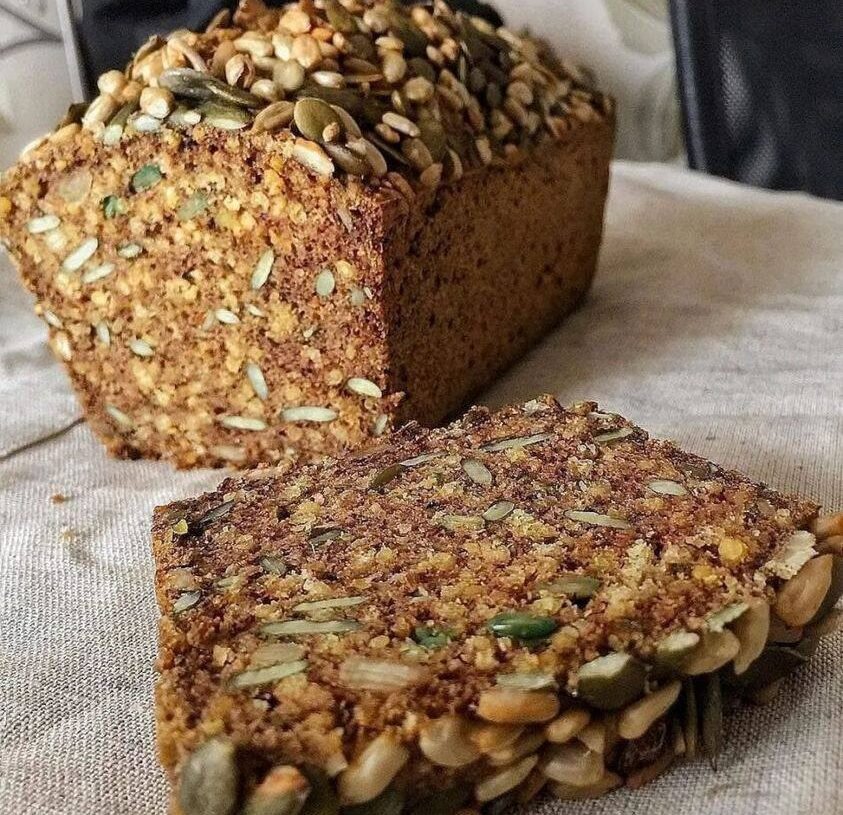Ingredients:
- 1 cup green buckwheat
- 1 glass of millet
- 1/4 cup flax seeds
- 1 glass of water
- 2 tablespoons coconut oil (optional)
- 1 teaspoon. soda
- 1/3 cup sunflower seeds
- 1/3 cup pumpkin seeds
- 1/4 cup chia seeds
- 2 teaspoons cumin seeds
- 1 teaspoon turmeric
- 1 teaspoon cardamom
- 1 teaspoon coriander
- 1-2 teaspoons of salt (according to your taste)
Preparation:⠀
1. Wash buckwheat and millet and soak them in water for at least 5 hours.
2. Grind the flaxseed and soak it in 1 glass of water, let it swell for 20 minutes.
3. Place the soaked green buckwheat and millet in a blender after draining the water, but without rinsing, grind until smooth. There may be unground millet particles or even whole ones, but this is good, the structure of the bread will be more interesting.
4. Pour the mixture into a bowl. Add the soaked and swollen ground flaxseeds.
Add 3-5 tablespoons coconut oil (optional)
Press the baking powder and add it to the dough.
5. Wash the sunflower and pumpkin seeds and mix them into the dough. Stir in chia seeds.
6. Grind 1 teaspoon of cumin seeds in the coffee grinder and mix 1 teaspoon of cumin seeds into the dough.
7. Add: turmeric, coriander, cardamom and salt (adjust to taste to get a slightly salty taste).
8. Mix everything, pour the dough into a mold (I use a special one for bread, but for baking you can use any variety, grease the mold with oil)
9. Sprinkle sunflower, pumpkin and flax seeds on top, press them a little into the dough to create a delicious seed coat.
10. Bake at 180* for 1 hour.
If you see the crust cracking during the baking process, open the oven and spray the bread and oven walls with water from a spray bottle.
11. When the bread is baked, remove it from the pan, wrap it in a towel and leave it until it cools completely.
⠀
Enjoy your meal!
Gut Health:
Plant-based diets are often associated with improved gut health due to the high fiber content from fruits, vegetables, and whole grains. A healthy gut microbiome is linked to better digestion and overall well-being.
Anti-Inflammatory Properties:
Many plant-based foods have anti-inflammatory properties, which can help in reducing inflammation in the body. Chronic inflammation is associated with various health issues, and a vegan diet may contribute to its prevention.
Sports Performance:
Contrary to the misconception that vegan diets lack protein, many successful athletes follow plant-based diets to enhance their performance. Plant-based proteins can support muscle building and recovery.
Reduced Risk of Foodborne Illnesses:
Plant-based diets eliminate the risk of foodborne illnesses associated with the consumption of undercooked or contaminated animal products.
Economic Impact:
A vegan diet can be more economical as plant-based protein sources tend to be cost-effective compared to some animal products. It may be a budget-friendly option for individuals or families.
Mindful Eating:
Adopting a vegan lifestyle often promotes mindful eating. Being more conscious of food choices and sources can lead to a healthier relationship with food and a greater appreciation for the environmental impact of dietary decisions.
Preservation of Biodiversity:
The expansion of animal agriculture often leads to habitat destruction and loss of biodiversity. Choosing a vegan diet supports the preservation of ecosystems and the protection of various species.
Culinary Diversity:
Veganism introduces individuals to a diverse range of cuisines and ingredients from around the world. Exploring plant-based cooking can be a culinary adventure, embracing flavors and techniques from different cultures.
Reduced Antibiotic Resistance:
The use of antibiotics in animal farming contributes to the rise of antibiotic-resistant bacteria. Opting for a vegan diet can be a way to reduce the demand for such practices and promote responsible antibiotic use.
Cruelty-Free Beauty and Personal Care:
Veganism extends to beauty and personal care products. Choosing cruelty-free, vegan alternatives ensures that your lifestyle aligns with ethical choices beyond just dietary preferences.
